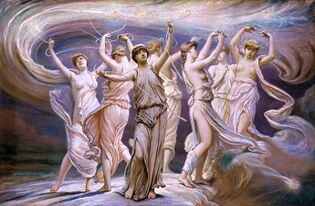Alcyone (Pleiad)
Topic: Unsolved
 From HandWiki - Reading time: 3 min
From HandWiki - Reading time: 3 min

Alcyone (/ælˈsaɪ.əniː/; Ancient Greek:), in Greek mythology, was the name of one of the Pleiades, daughters of Atlas and Pleione or, more rarely, Aethra.[1] She attracted the attention of the god Poseidon and bore him several children, variously named in the sources: Hyrieus, Hyperenor, and Aethusa;[2] Hyperes and Anthas;[3] and Epopeus.[4][5] By a mortal, Anthedon, Alcyone became the mother of the fisherman Glaucus, who was later transformed into a marine god.[6]
Etymology
Alkyóne comes from alkyón (ἀλκυών), which refers to a sea-bird with a mournful song[7] or to a kingfisher bird in particular.[8] The meaning(s) of the words is uncertain because alkyón is considered to be of pre-Greek, non-Indo-european origin.[9] However, folk etymology related them to the háls (ἅλς, "brine, sea, salt") and kyéo (κυέω, "I conceive"). Alkyóne originally is written with a smooth breathing mark, but this false origin beginning with a rough breathing mark (transliterated as the letter H) led to the common misspellings halkyón (ἁλκυών) and Halkyóne (Ἁλκυόνη),[10] and thus the name of one of the kingfisher bird genus' in English Halcyon. It is also speculated that Alkyóne is derived from alké (ἀλκή, "prowess, battle, guard") and onéo (ὀνέω, from ὀνίνεμι, onínemi,[11] "to help, to please").[12]
| Relation | Names | Sources | ||||||
|---|---|---|---|---|---|---|---|---|
| Apollodorus | Ovid | Hyginus | Pausanias | Athenaeus | Clement | |||
| Parentage | Atlas and Pleione | ✓ | ✓ | ✓ | ||||
| Atlas and Aethra | ✓ | |||||||
| Consort | Poseidon | ✓ | ✓ | ✓ | ✓ | |||
| Anthedon | ✓ | |||||||
| Children | Aethusa | ✓ | ||||||
| Hyrieus | ✓ | ✓ | ✓ | |||||
| Hyperenor | ✓ | |||||||
| Epopeus | ✓ | |||||||
| Hyperes | ✓ | |||||||
| Anthas | ✓ | |||||||
| Glaucus | ✓ | |||||||
Notes
- ↑ Schmitz, Leonhard (1867). "Alcyone (1)". in William Smith. Dictionary of Greek and Roman Biography and Mythology. 1. Boston: Little, Brown and Company. pp. 108. http://www.ancientlibrary.com/smith-bio/0117.html.
- ↑ Apollodorus, 3.10.1
- ↑ Pausanias, 2.30.7
- ↑ Hyginus, Fabulae Preface, p. 11, ed. Staveren
- ↑ Ovid, Heroides 19.133
- ↑ Athenaeus, Deipnosophistae 7
- ↑ "ἀλκυών" (in en). https://homeric_el_en.en-academic.com/615/%E1%BC%80%CE%BB%CE%BA%CF%85%CF%8E%CE%BD.
- ↑ Woodhouse, Sidney Chawner (1910). English–Greek Dictionary: A Vocabulary of the Attic Language. London: Routledge & Kegan Paul Limited. p. 470. ISBN 9780710023247. https://artflsrv03.uchicago.edu/cgi-bin/efts/sqldbs/WOODHOUSE/woodhouse.py?pagenumber=470&pageturn=1.
- ↑ Beekes, Robert Stephen Paul; van Beek, Lucien (2010). Etymological Dictionary of Greek. 1. Leiden: Brill. p. 71. ISBN 978-90-04-17420-7.
- ↑ Liddell, Henry George; Scott, Robert. "A Greek-English Lexicon, ἀλκυών". Tufts University. https://www.perseus.tufts.edu/hopper/text?doc=Perseus:text:1999.04.0057:entry=a)lkuw/n.
- ↑ "ὀνέω - Ancient Greek (LSJ)". https://lsj.gr/index.php?title=%E1%BD%80%CE%BD%CE%AD%CF%89&mobileaction=toggle_view_desktop.
- ↑ "ALCYONE (Alkyone) - Boeotian Pleiad Nymph of Greek Mythology". https://www.theoi.com/Nymphe/NympheAlkyone.html.
References
- Athenaeus of Naucratis. The Deipnosophists or Banquet of the Learned. London. Henry G. Bohn, York Street, Covent Garden. 1854. Online version at the Perseus Digital Library.
- Athenaeus of Naucratis. Deipnosophistae. Kaibel. In Aedibus B.G. Teubneri. Lipsiae. 1887. Greek text available at the Perseus Digital Library.
- Hyginus, Fabulae from The Myths of Hyginus translated and edited by Mary Grant. University of Kansas Publications in Humanistic Studies. Online version at the Topos Text Project.
- M. Grant and J. Hazel, Who's Who in Greek Mythology, David McKay and Co Inc, 1979
- Pausanias, Description of Greece with an English Translation by W.H.S. Jones, Litt.D., and H.A. Ormerod, M.A., in 4 Volumes. Cambridge, MA, Harvard University Press; London, William Heinemann Ltd. 1918. Online version at the Perseus Digital Library
- Pausanias, Graeciae Descriptio. 3 vols. Leipzig, Teubner. 1903. Greek text available at the Perseus Digital Library.
- Apollodorus, The Library with an English Translation by Sir James George Frazer, F.B.A., F.R.S. in 2 Volumes, Cambridge, MA, Harvard University Press; London, William Heinemann Ltd. 1921. Online version at the Perseus Digital Library. Greek text available from the same website.
- Publius Ovidius Naso, The Epistles of Ovid. London. J. Nunn, Great-Queen-Street; R. Priestly, 143, High-Holborn; R. Lea, Greek-Street, Soho; and J. Rodwell, New-Bond-Street. 1813. Online version at the Perseus Digital Library.
 KSF
KSF